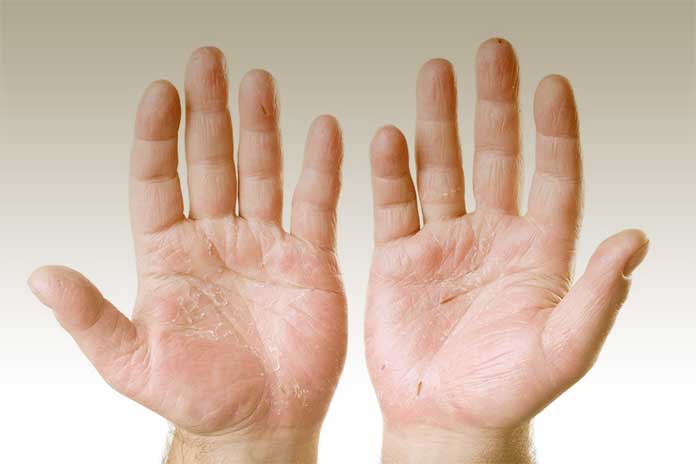In times of Corona, regular hand washing is one of the most critical hygiene measures. Frequent cleaning with soap and water has disadvantages: Since the beginning of the pandemic, hand eczema has increased significantly. Experts recommend disinfectants as a gentle alternative.
Every child knows the AHA formula: The H in the middle stands for hygiene. In addition to coughing and sneezing into the crook of your arm, this also includes thorough hand washing. However, frequent contact with soap and water causes the skin to suffer – it dries out, and its natural protective acid mantle is attacked. Therefore, the Robert Koch Institute recommends all people who work in the medical or nursing field: disinfect their hands regularly instead of washing them.
Regular hand-washing is officially recommended for the general population. The Federal Center for Health Education (BZgA) wrote detailed tips on washing your hands properly with soap. Possible disadvantages were not considered. “It should be noted that the agents used for hand hygiene not only have the desired effect of detaching or killing the pathogen but can also affect the skin organ itself,” says Professor Dr. med. Peter Elsner, a representative for public relations of the German Dermatological Society (DDG).
Also Read: 12 Ultimate Health Tips: The Common Cold Doesn’t Stand A Chance
Soap And Water Dry Out The Skin
An essential characteristic of the skin is its barrier function. The protective layer in the so-called horny layer consists of dead skin cells, sweat, and fats secreted by the sebum glands. With frequent cleaning with soap and water, the protective fats are constantly removed, the skin dries out, and its protective layer gets holes. This promotes skin irritation and the development of eczema.
Initial reports from dermatologists’ practices about an increase in hand eczema just a few months after the start of the corona pandemic confirmed the assumption that intensified hand hygiene poses risks to skin health. It is known from previous studies that hand eczema is prevalent among health care workers – for professional reasons, these people have to practice particularly intensive hand hygiene.
Disinfecting Your Hands Is Better Than Washing
A current study of 114 employees in the operating room and the intensive care unit of the Munich University Hospital has now shown that hand hygiene measures increased significantly under the conditions of the corona pandemic. As a result, 90 percent of employees showed clinical signs of hand eczema. The most common symptoms were dry skin (83.2 percent), redness (38.6 percent), itching (28.9 percent), burning (21.1 percent), flaking (18.4 percent), cracks (9.6 Percent), and pain (4.4 percent).
The experts also know from occupational health studies that the unfavorable effects of soaps are intensified by wearing gloves over the past few years. On the other hand, if people disinfect their hands with suitable alcoholic preparations, that is not the case, emphasizing Professor Elsner: “Maintaining skin health requires rethinking the hand hygiene strategy,” says the director of the Clinic for Skin Diseases at Jena University Hospital. From a dermatological and occupational medical point of view, he advises against the use of soaps in times of intensified hand hygiene. “Disinfecting in connection with intensive skincare is gentler on the skin.”
The German Dermatological Society recommends the following measures to maintain skin health despite intensive hand hygiene:
- Disinfection with a virus-effective alcoholic hand disinfectant, if possible with protective auxiliaries such as glycerol, should take precedence over soap or washing lotions if the hands are not visibly dirty.
- After disinfection, the skin should be covered entirely with a care product that supports the regeneration of the skin barrier.
- If people disinfect their hands instead of washing them and still develop hand eczema, the rash should be treated by a dermatologist.
Also Read: Menstrual Pain The 3 Best Ways To Relieve Period Pain


